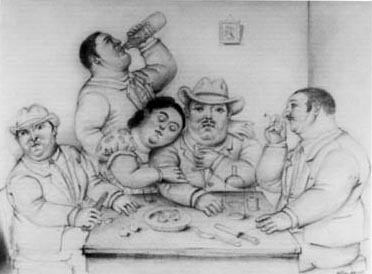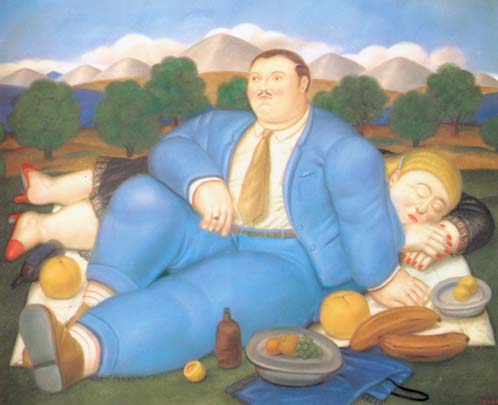
"Bergman has always been aware of the importance of the soundtrack, seeking a little extra sound that will give a scene an added dimension."


You may have noticed the web has pictures. Some have objected. How can the web think itself a serious literary medium with so many pictures? Ah, but does an author not paint a picture with his words? Herman Melville made some of the finest sketches of sperm whales known to man. James Joyce drafted blueprints for city planners in Dublin. Not a single detail was lacking, no manhole missing, no soft, brown liver unrewarded for a lifetime of abuse. And J.K. Rowling does bas-relief for the masses. So let the web have its pictures, in particular the little white kitty that pirouettes or the fire hydrant that wiggles. Let’s see your precious ‘illustrations’ do that. Oh, and the mail box that opens to let in the floating letter. Sensational. Nothing wrong with animated GIF’s.
And what about sounds? Perhaps the author (web artist) has carefully chosen some music to enhance the browsing experience (children will learn to browse at an early age). I once saw a mostly photography exhibit by Nic Nicosia. He had lots of quality snaps on the wall, but he also had some looping videos as part of the exhibit (contemporary art has been making people think for a least twenty years). The music leaking from the video installations made for effective (if accidental) soundtracks to the nearby pictures. Even now it’s hard to remember those photographs without remembering that music, or at least the way it made me feel. Later, I had a similar experience at a Viktor Schreckengost exhibit at the Cleveland Museum of Fine Art. The famous Jazz Bowl (which I had never heard of) made so much more sense with Duke Ellington percolating from unseen speakers. Me, the Duke, and that bowl shared something that day, which most people cannot even imagine (unless they click here).
So I walked out of the exhibit to find, of all things, one Viktor Schreckengost, age ninety-four, sitting at a table with his daughter. In front of the table was a line of people who had all been waiting—a lot longer than me—to meet him. So I did what any reasonable person would have done: I bought a one dollar post card of a Jazz Bowl and got in line. When my turn came, I pushed my card in front of him, and politely asked if he would sign it. He signed it. But then, without warning, he looked up at me and smiled, “Did you like the exhibit?” [internal scream sponsored by Warner Bros] Oh my god! What do you say when the Pope asks you how you liked the sermon? And you can’t pretend to speak another language either, cause he’ll damn well know it. It seemed to me I had two main options. “Yeah, your work is pretty good” or “oh yes, I’ve been your biggest fan for—at least two hours.” I chose ‘stand there like an idiot for a few seconds’ until finally, my mouth just said, “yes.” And everyone seemed satisfied, or relieved, sort of like when someone asks a baseball player if he’s already thinking about the next series, and then he says he’s just going to “take it one game at a time”—collective sigh of relief across T.V. viewing audience. Or maybe it’s “in God’s hands now.” Hey, can my day at work tomorrow be in God’s hands? That would really take a load off. Listen, we’re going to pay you five million dollars a year, and all you have to do is learn these two mind numbing phrases. And coaches—they’re even worse. They not only say the shit, but then, before you can even say anything, they come out with, “Well, they may be clichés, but there’s a reason for it.” Dammit. Hieronymo’s foiled againe—by the skipper.
So now let us consider a web site put out by a wine tasting social club called the Wine Boobs. Essentially they would get together in a group of about five or six people each bringing a bottle of wine in a brown paper bag so as to conceal its identity. They would then taste the wines and reverse transcribe their discussion as if into a screenplay, which you could then read.
Please read the short piece itself. Then come back for further instructions. Oh, you're back. While you were gone, I was just thinking about the monsters in Where the Wild Things Are. I thought about the also wild illustrations in I'm blanking on the title, but I seem to remember there was some sort of clue hidden in the illustrations that would enable you to find a huge pile of cash buried somewhere, probably in a French coastal town, but I suppose it could be anywhere. That book was cool. And Edward Gorey. And who could ignore the lush autumnal colors in the more recent Polkabats and Octopus Slacks? I thought about Kubrick's image of the Earth in 2001 (and the music that goes with it).
Now let us discuss the aforementioned web site, the web site that uses words and pictures, as the existential work it is, addressing the ankle-tugging theme of man's importance as an individual. We go through life pursuing our little interests, patting and being patted on the back, but eventually, at some point, we all turn 'to windward'. In order to understand what I'm talking about, you have to understand how this wine tasting bunch known as the Wine Boobs started out. In the early days, they were youthful and optimistic, poor and clever, and living in Philadelphia. They got downright excited to rediscover the glory of Gewürztraminer [WB #9] and grieved for the overlooked complexities of a twenty year old Barbaresco [WB #15]. Their fun and silliness knew no limits. Parmigiano was grated so vigorously so as to be “shrapnel” hitting people in the face, and the qualities of a wine were more than once compared to those of the opposite sex, and vice versa. Now for the most part, the Boobs had never flirted with pictures or sounds, instead using only the Roman alphabet (God’s alphabet) to convey their wisdom and humor. In fact, they even once described the music their protagonists heard during the tasting, but of course, no real sound. Yet this time, without warning, they used a picture. I mean, they really used a picture. And I thought to myself, “Why the hell not? Just why the hell not?” And would it have been the same had they just written [screen fills up with giant picture of blue sun—and it’s magnificent]?

But in this final essay [WB #23], the first after a very long hiatus, one senses the post-power chord disenchantment of a rock band who’ve accidentally peaked, and it’s far too soon. And now we’ve finally had the fifty year old Bordeaux and the thirty year old Burgundy and the Sauternes we were saving for some other narrative. It’s over, and nothing is changed. The meal is ended, she is bored and tired. Not even another cigarette can help. Should we try to regain that sense of anticipation we had in the beginning, when we only dreamed of having the great wine? Can we ever again be satisfied with twelve dollar Gewürz because “it has so much going on?” And worst of all, as hinted at by the image of “the big blue sun,” could there be something more important than our wines? Than ourselves? Our bitches? Where do we go from here? Where go? Where? Wallala leialala. Dalran. Damyata. Syrah.
[2001]
The future of this discussion:
In the early years, the internet was able to merge sound, text and graphic to provide a multimodal experience that was unprecedented. Eventually, the widespread accessibility of the medium led to quality control problems and great inefficiency. Time travel was still hundreds of years away, and so, for truly sensitive people, time was the only real commodity. As such, people could scarcely waste it panning for nuggets on the internet. Search engines and directories were employed to overcome the problem by categorizing the growing content. However, these efforts would ultimately prove futile. Instead, they would come to rely on a modified version of what historians would call the publishing barrier. For centuries, long before the internet, the publishing barrier had ensured that only the highest quality writing was put into books, magazines and news tabloids, which people would then purchase and read with their eyes. As the internet became unworkable, the publishing system was adapted to form the CCC (carefully chosen content), at first a supplement, but later...